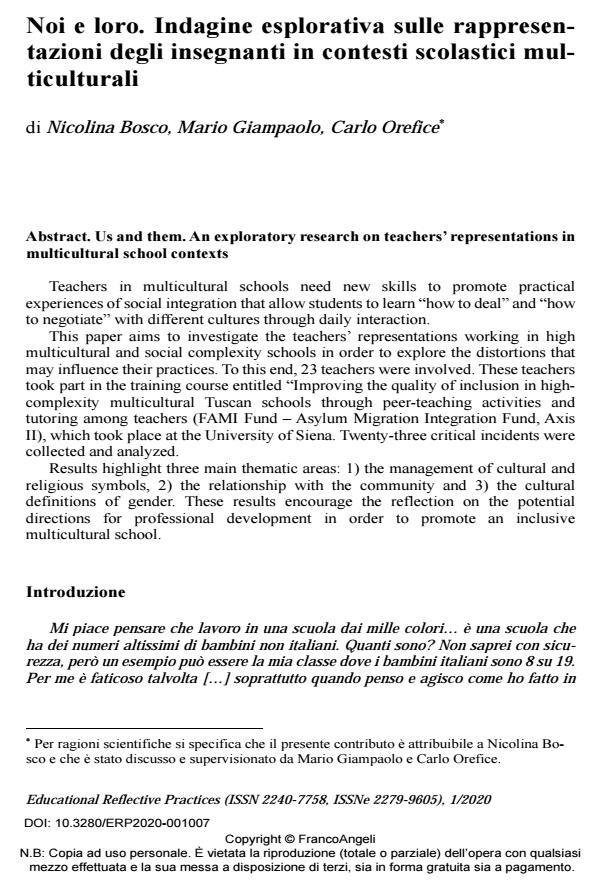Us and them. An exploratory research on teachers’ representations in multicultural school contexts
Journal title EDUCATIONAL REFLECTIVE PRACTICES
Author/s Nicolina Bosco, Mario Giampaolo, Carlo Orefice
Publishing Year 2020 Issue 2020/1
Language Italian Pages 14 P. 132-145 File size 230 KB
DOI 10.3280/ERP2020-001007
DOI is like a bar code for intellectual property: to have more infomation
click here
Below, you can see the article first page
If you want to buy this article in PDF format, you can do it, following the instructions to buy download credits

FrancoAngeli is member of Publishers International Linking Association, Inc (PILA), a not-for-profit association which run the CrossRef service enabling links to and from online scholarly content.
Teachers in multicultural schools need new skills to promote practical experiences of social integration that allow students to learn "how to deal" and "how to negotiate" with different cultures through daily interaction. This paper aims to investigate the teachers’ representations working in high multicultural and social complexity schools in order to explore the distortions that may influence their practices. To this end, 23 teachers were involved. These teachers took part in the training course entitled “Improving the quality of inclusion in high-complexity multicultural Tuscan schools through peer-teaching activities and tutoring among teachers (FAMI Fund - Asylum Migration Integration Fund, Axis II), which took place at the University of Siena. Twenty-three critical incidents were collected and analyzed. Results highlight three main thematic areas: 1) the management of cultural and religious symbols, 2) the relationship with the community and 3) the cultural definitions of gender. These results encourage the reflection on the potential directions for professional development in order to promote an inclusive multicultural school.
- La Student Measure of Culturally Responsive Teaching scale: adattamento e validazione per il contesto universitario italiano Nicolina Bosco, Loretta Fabbri, Mario Giampaolo, in EXCELLENCE AND INNOVATION IN LEARNING AND TEACHING 1/2022 pp.39
DOI: 10.3280/exioa1-2022oa13935 - Fostering interculturally responsive educators for a sustainable society Nicolina Bosco, Carlo Orefice, Loretta Fabbri, Mario Giampaolo, in EDUCATION SCIENCES AND SOCIETY 2/2022 pp.227
DOI: 10.3280/ess2-2022oa14768
Nicolina Bosco, Mario Giampaolo, Carlo Orefice, Noi e loro. Indagine esplorativa sulle rappresentazioni degli insegnanti in contesti scolastici multiculturali in "EDUCATIONAL REFLECTIVE PRACTICES" 1/2020, pp 132-145, DOI: 10.3280/ERP2020-001007